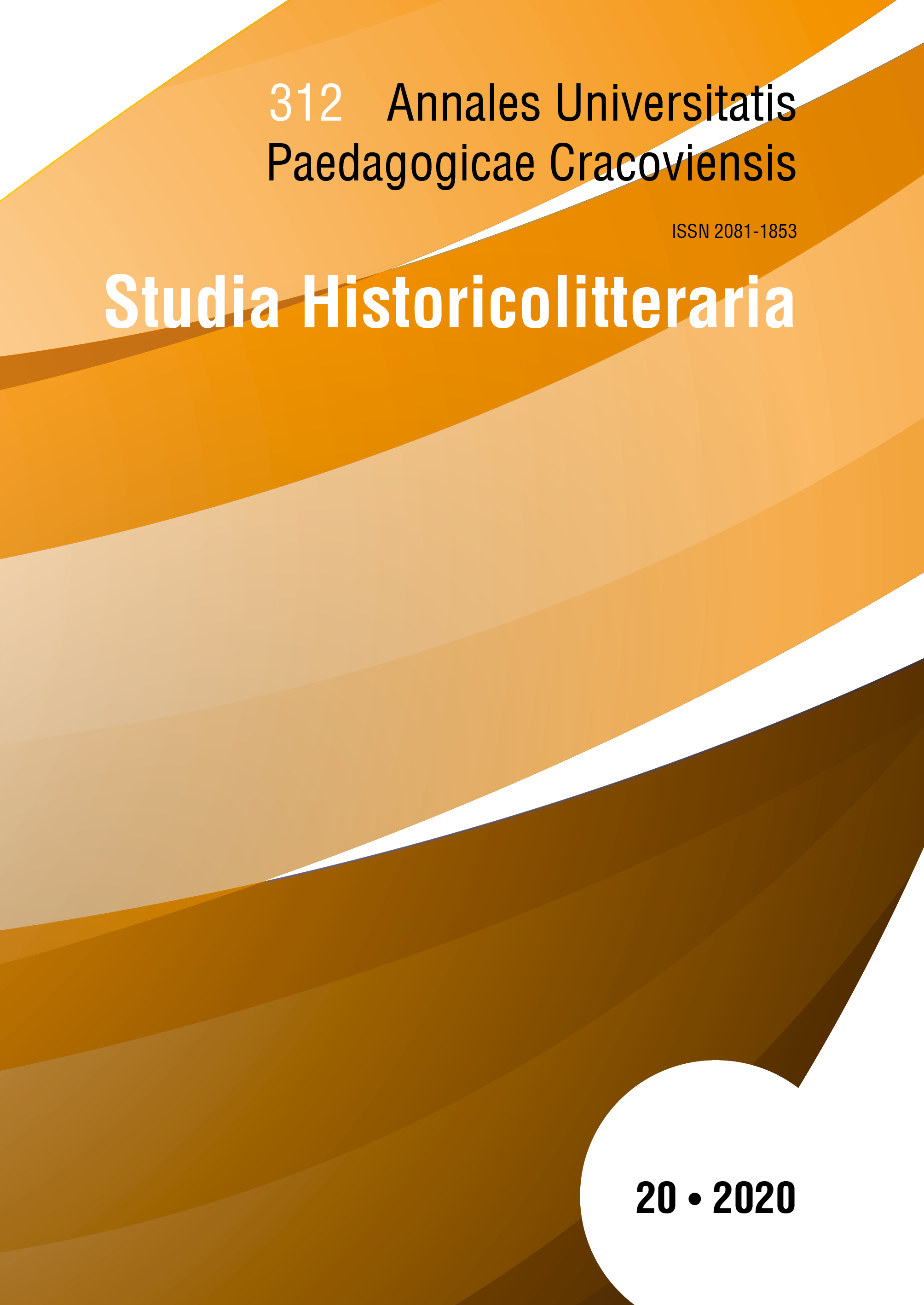Genology and finesse: The shortest songs by Jan Kochanowski
Main Article Content
Abstract
The purpose of this paper is the analysis of the shortest songs from Jan Kochanowski’s collection Pieśni. These include a petrarchist Pieśń II 21, and above all, four horatian-origin works Pieśń: I 11 (Stronisz przede mną, Neto nietykana), II 7 (Słońce pali, a ziemia idzie w popiół prawie), II 16 (Nic po tych zbytnich potrawach…) and II 23 (Nie zawżdy, piękna Zofija…). Following a short review of previous attempts at classifying Kochanowski’s Pieśni, which were made by Polish scholars, as well as considering other options of categorising lyrical songs, the author indicated the contexts of particular works, described their rhetorics and emphasised the mastery of the poet, which is manifested through the construction of such sophisticated forms. A song, under Kochanowski’s pen, became a brief but comprehensive genre. It comprised solemnity and joy, elegiac mood and frivolous joke.
Downloads
Article Details

This work is licensed under a Creative Commons Attribution-NonCommercial-NoDerivatives 4.0 International License.
COPYRIGHT POLICY
The publisher of "Annales Universitatis Paedagogicae Cracoviensis.Studia Historicolitteraria" is authorised to use and distribute all the materials published in the journal on the basis of a non-exclusive licence agreement unlimited in time – previously concluded for an indefinite period of time each time with the author of a specific paper in the fields of exploitation specified in the agreement.
OPEN ACCESS POLICY
"Annales Universitatis Paedagogicae Cracoviensis.Studia Historicolitteraria” is an open access journal, and all its contents are available for free to users and/or their institutions on the basis of non-exclusive licenses under Creative Commons (CC BY CC-BY-4.0). Users can read, download, make copies, distribute, print, search, or to link to full text articles in this journal without the prior permission of the publisher or the author.This is consistent with the definition of open access BOAI (http://www.soros.org/openaccess).
References
Alciatus A., Emblematum liber, Leiden 1591.
Ancona R., The Subterfuge of Reason. Horace, Odes I 23 and the Construction of Male Desire, [w:] Why Horace? A Collection of Interpretations, red. W. Anderson, Wauconda 1999, s. 63–72.
Brahmer M., Petrarkizm w poezji polskiej XVI wieku, Kraków 1927.
Canti carnachialeschi del Rinascimento, oprac. Ch.S. Singleton, Bari 1936.
Cochanovius I., Lyricorum libellus, Cracoviae 1580.
Davis G., Polyhymnia. The Rhetoric of Horatian Lyric Discourse, Berkeley 1991.
Floryan W., Forma poetycka „Pieśni” Jana Kochanowskiego wobec kierunków liryki renesansowej, Wrocław 1948.
Glomski J., Historiography as Art. Jan Kochanowski’s Lyricorum libellus (1580), [w:] Renaissance Culture in Context. Theory and Practice, red. J.R. Brink, W.F. Gentrup, Aldershot 1993, s. 145–154.
Highet G., The Classical Tradition. Greek and Roman Influences on Western Literature, Oxford – New York 2015.
Horacy, Dzieła wszystkie, Otto Vaenius, Emblematy horacjańskie, przeł. i oprac. A. Lam, Pułtusk – Warszawa 2010.
Horacy, Dzieła wszystkie. Wydanie dwujęzyczne polsko‑łacińskie, przeł. A. Lam, Warszawa 2019.
Jennings V., Ion’s Hymn to Kairos, [w:] The World of Ion of Chios, oprac. V. Jennings, A. Katsaros, Leiden – Boston 2007, s. 331–346.
Kochanowski J., Dzieła polskie, oprac. J. Krzyżanowski, Warszawa 1989.
Laumonier P., Ronsard. Poète lyrique. Étude historique et littéraire, Genève 1997.
Liryka starożytnej Grecji, oprac. J. Danielewicz, Warszawa – Poznań 1996.
Maddison C., Apollo and the Nine. A History of the Ode, Baltimore 1960.
Murgatroyd P., The Amatory Elegies of Joannes Secundus, Leiden 2000.
Nowicka‑Jeżowa A., Madrygały staropolskie. Z dziejów liryki miłosnej w epoce renesansu i baroku, Warszawa 1978.
Poemata selecta Italorum qui saeculo decimo sexto latine scripserunt, Oxford 1808.
Sarbiewski M.K., Characteres lyrici seu Horatius et Pindarus – Charaktery liryczne, czyli Horacy i Pindar, [w:] Praecepta poetica – Wykłady poetyki, przeł. S. Skimina, Wrocław 1958, s. 21–158.
Seneka, Fedra, przeł. A. Świderkówna, oprac. W. Strzelecki, Wrocław – Warszawa 2006.
Sinko T., Wstęp, [w:] J. Kochanowski, Pieśni i wybór innych wierszy, Wrocław 1927.
Śnieżko D., Jan i Zofije, [w:] Wiązanie sobótkowe. Studia o Janie Kochanowskim, red. E. Lasocińska, W. Pawlak, Warszawa 2015, s. 339–347.
Tesauro E., Il cannocchiale Aristotelico…, Bologna 1675.
Wilczek P., Pieśni, [w:] Lektury polonistyczne. Jan Kochanowski, red. A. Gorzkowski, Kraków 2001, s. 306–321.
Wilkinson L.P., Horace and His Lyric Poetry, Cambridge 1945.
